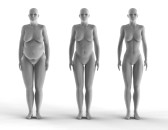Support Digestion and Fat Loss with Betaine Hydrochloride (HCl)

Betaine Hydrochloric (HCl) is an organic component also known as hydrochloric acid. HCl supplements can potentially optimize fat loss and digestion. HCl helps to ensure our bodies have adequate stomach acid to allow foods to break down properly. The increased of the HCl levels in the stomach will improve the absorption of the essential nutrients such as protein, calcium, vitamin B9 and 12, magnesium, zinc, iron, vitamin C and other antioxidant vitamins such as vitamins A and E.
Better digestion and absorption of protein and nutrients will also support protein synthesis and the development of lean body mass, while helping us avoid deficiencies that can cause poor health and hinder weight loss attempts.
You will also likely find that an increased in HCl level will improve your sleep because your body is beginning to absorb all the minerals and vitamins it needs, which will affect your hormone and neurotransmitter levels. Not only will you no longer be deficient in nutrients that help with energy and give you stamina, but sleep will be more restorative. The combination will support body composition and fat loss.
A healthy body does not need additional support. However, research shows that the natural level of HCl and digestive enzymes decreases as we age or if we abuse our gastrointestinal tracts through food excesses, chemical use, and stress. Our stomach’s ability to produce HCL decreases by about 1 percent every year, meaning that by age 50, your HCl is 50 percent lower than when you were born. When you eat more frequently than required by the body or overconsume fats and proteins, acid production begins to decrease. Decreased HCl production may lead to poor digestion, with symptoms such as gas, bloating, and discomfort after rich meals. The constant stress of modern life including exposure to radiation, lack of sleep, poor diet, and oxidative stress can also cause more rapid aging and reduce the stomach’s ability to produce HCl. Stress intensive people are associated more with HCl hypersecretion and peptic ulcer disease (at least initially).
Low HCl production is associated with many other problems such as iron deficiency, osteoporosis (resulting in part from decreased calcium absorption), and gallstones. More than half the people with gallstones show decreased HCl secretion compared with gallstone-free patients. Diabetics also have lower secretion, as do people with eczema, psoriasis, seborrheic dermatitis, vitiligo, and tooth and periodontal disease. With low stomach acid levels, there can be an increase bacterial pathogens going into the lower GI tract, causing infection, and putting you at risk of disease and stomach cancer.
You don’t have to take HCl forever. We can correct our low stomach acid by eating a balanced diet of wholesome foods and by reducing our daily levels of stress. Some home remedies such as juice of half a lemon squeezed in water or a teaspoon of apple cider vinegar in a glass of warm water 20–30 minutes before meals can help increase the stomach acid level. Drink tea with rosemary, ginger, cumin, or orange peel before meals can also be helpful.
Other Articles
- Eggs Reduce Stroke Risk
- Here’s What Happens to Your Body When You Consume Okra
- Reishi is now believed to have life extending properties
- Frequently Asked Questions about Allergy
- Carnitine (L-carnitine) Burns Unwanted Fats Naturally
- Could Papaya Leaf be a Cancer Treatment?
- Malabar Spinach
- How Does Essential Natural Male Vitality Work?
- Ultra-violet (UV) Rays and Sunscreens Explained
- Men’s Sexual Wellness: Key to Healthy and Enjoyable Sex Life



Comment for this article